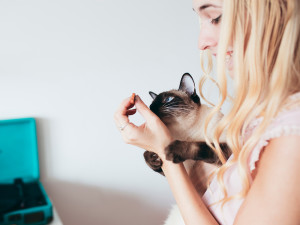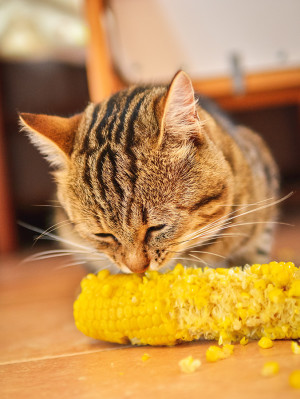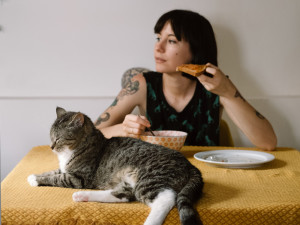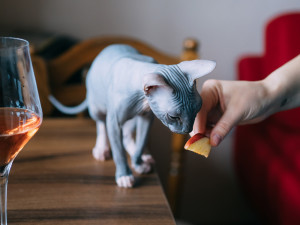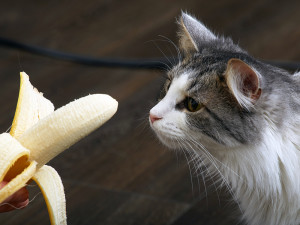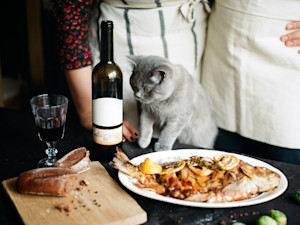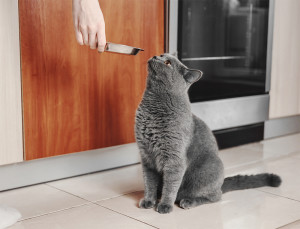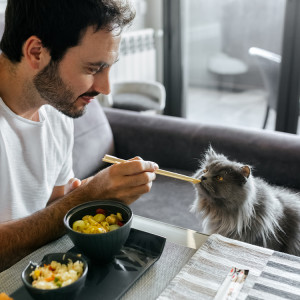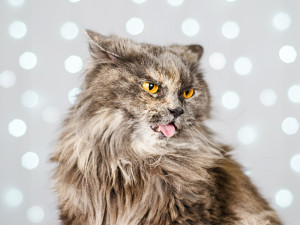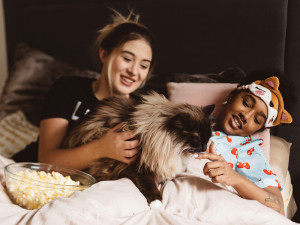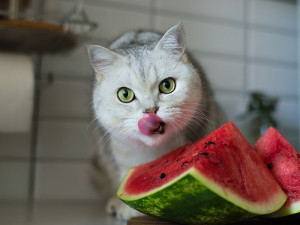Can Cats Eat Carrots?
Learn whether your little Bugs Bunny can crunch on the veggie.
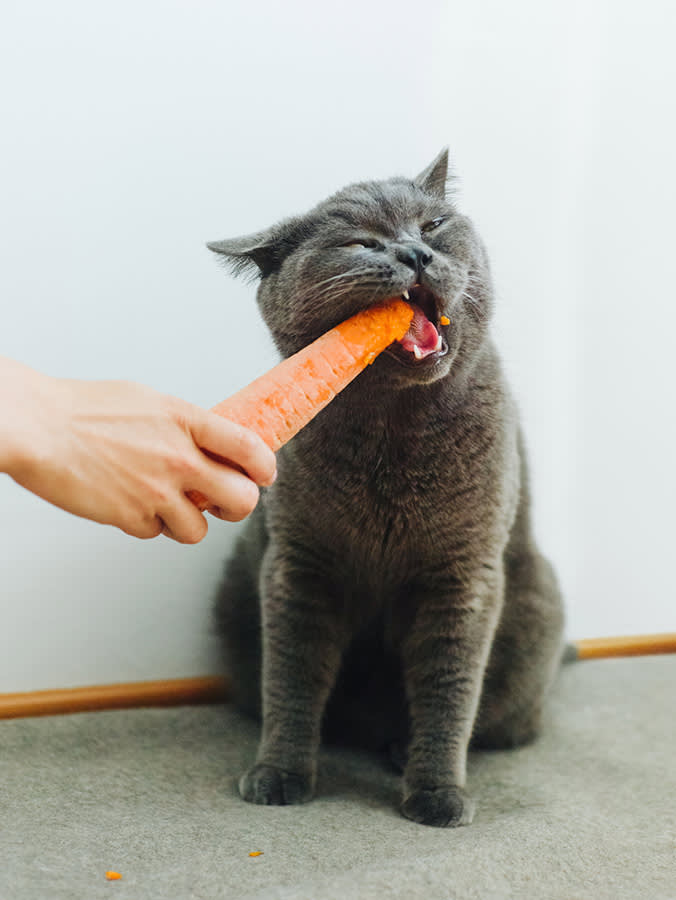
Share Article
If you have a curious cat who loves the satisfying crunch of a sweet snack, carrots may be a great vegetable to introduce into their diet because they are healthy and safe for most cats. Carrots are a versatile root vegetable used in so many different elements of our diet; from baby carrots and hummus, to warm roasted carrots, to soups, and even cake, carrots are everywhere.
And while many of these recipes may not be good options for your cat, raw or steamed carrots can be a great snack option for cats, providing beneficial nutrients as well as satisfying textures and new experiences. Read on to learn all about how to share carrots with your cat.
Nutrition facts about carrots for cats
Carrots are the taproot of the Daucus carota plant. They grow underground and absorb water and nutrients from the soil, which then feed the rest of the plant. Like other root vegetables, they contain a lot of starch, along with fiber, vitamins, and minerals. The green leafy part of the carrot that grows above ground is also edible and non-toxic to cats. It contains additional nutrients as well. Some of the main nutrients found in carrots include:
Starches: Carrots are a starchy vegetable, meaning they contain large amounts of carbohydrates that are used as an energy source by the body. Cats can utilize carbohydrates for energy but do not have a high demand for them.opens in new tab
Fiber: Fiber is a carbohydrate that is not broken down during digestion and can provide important nutrients to the helpful microbes within the digestive tract. It also helps to bulk up the stool and prevent constipation. It can help cats feel full on lower calorie diets and regulate blood sugar.
Vitamin A: If you’ve heard that you should eat your carrots because they are “good for your eyes,” it is actually sort of true. Carrots contain beta-carotene, a precursor to Vitamin Aopens in new tab that supports eye health. Vitamin A is also important for bone health, white blood cell production, and normal everyday cell function.
Are carrots good for cats?
Carrots are fine for cats in moderation but are not a necessary part of their diet. They provide beneficial nutrients and can serve as a satisfying low-calorie treat. This may be useful for overweight cats that cannot eat a lot of high calorie treats but still need the satisfying crunch of a little something between meals.
Like other carbohydrate-rich foods, they should be offered only in small amounts to cats. Cats are obligate carnivores and need to get most of their calories from proteins and fats. It is important to keep all treats and table scraps to a minimum and ensure that the bulk of your cat’s diet comes from a complete and balancedopens in new tab cat food.
Can cats eat carrot tops?
The leaves and flowers of the carrot plantopens in new tab, also called the carrot top, are non-toxic to cats. There are no serious health risks associated with eating this part of the carrot plant, and humans also eat carrot greens in various recipes. There are some reports of skin irritation caused by psoralens, a compound found in the flowers. If this occurs, it tends to be mild and resolves on its own in most cases.
Are carrots completely safe for cats?
Carrots are a safe snack for cats and can be beneficial as the occasional complement to their main diet. As with all snacks and treats, it is important to use them sparingly and keep treats to less than 10 percent of your cat’s total dietary intake. This is because cats have unique nutritional needs that are satisfied by eating a complete and balanced cat food diet.
If they eat a lot of treats, they may not eat enough of their cat food to meet their body’s needs, and this can lead to nutritional deficiencies. In other cases, cats may eat all of their treats in addition to all of their cat food, which can push their daily caloric intake too high, putting them at risk for obesity and related health problems. Here are some highlights to keep in mind if you are feeding carrots to your cat:
Nutritional benefits: Carrots provide important nutrients including fiber and Vitamin A, which can be healthy for cats too. Your cat’s daily diet already includes enough of these nutrients to meet their needs, so snacking on carrots would be an added bonus.
Low in Calories: Like many vegetables, carrots are low in calories, relative to their size because of their high water and fiber content. This can come in handy if you want to provide your kitty with a satisfying snack without adding too many calories to their overall diet.
High-Starch Content: While carrots are fairly low in calories, they are high in starches. This is important to keep in mind because cats are obligate carnivores and don’t process carbohydrates. All starchy snacks should be shared in moderation. This is especially important for diabetic cats because they may need an even lower carbohydrate diet to help control their blood sugar.
Choking hazard: Carrots can be difficult to chew given their hard, crunchy texture, so always monitor your cat closely when they are gnawing on a piece of carrot. Avoid giving them large chunks that could cause choking if swallowed whole. It may be helpful to offer steamed carrots that are softened or to chop or shave the carrot into more manageable bite-sized pieces too.
The bottom line: Can cats eat human food?
Cats can eat human food, and you may be surprised to discover which foods your cat actually finds appealing and which ones lead to a stink face from your furry friend. Offering your cat different snacks can help keep things interesting and provide enrichment and excitement to your cat.
It is always important to do your research first to make sure the food you are providing is safe and non-toxic to cats. Start with a very small amount of the new food and make sure that your cat’s primary diet is a complete and balanced cat food diet. There are also many human foods that are unfortunately toxic to cats, so be sure to consult your veterinarian if you have any questions about what foods are safe.
Other human foods that are safe for cats
Bananas can be a good food to share with your cat in moderation.
Corn is OK in small amounts, but be sure to limit it to the occasional taste.
Ham can be shared from time to time, — just watch out for the sodium content.
Other human foods that are dangerous for cats
Cheeses can be risky to share with your cat, especially if they are higher in lactose or contain raw milk.
Garlic can cause digestive upset, or in severe cases, a life-threatening anemia.
Chocolate contains methylxanthines and caffeine which can be toxic to cats.
FAQs (People also ask):
Is it OK to give cats carrots?
Yes, it is ok to give cats small amounts of carrots. They are non toxic and can provide healthy nutrients to your cat.
How many carrots can a cat eat?
Cats should get the bulk of their diet from a balanced cat food. Treats like carrots should be less than 10 percent of their total caloric intake.
Why do cats like carrots?
Some cats are very attracted to the smell of carrots, and others may be intrigued by the crunch.
References:
ASPCA Poison control: Foods You can Safely Share with your Pets opens in new tab
Harvard Medical School: The Pros and Cons of Root Vegetables opens in new tab

Dr. Amy Fox, DVM
Amy Fox, DVM is a small animal veterinarian in New York City. A lifelong animal lover, Dr. Fox studied biology in college and then worked as a veterinary nurse before pursuing veterinary school at Cornell University. She has worked in many different settings including shelter medicine, emergency medicine, general practice, and animal cruelty and forensics. She is especially interested in nutrition, preventative medicine and care for senior pets. Dr. Fox also enjoys writing about veterinary medicine and teaching. In her free time she loves to cook, garden, and go for long runs.
Related articles
![A grey cat looking at a dish of fish]()
The 5 Best Fish Oils for Cats
The next best thing to branzino, omega-3s support your cat’s skin, brain, joint, and heart health.
![Hand holding food bowl peeks into frame as a cat looks up expectantly]()
The Ultimate Puzzle: Picking the Right Cat Food
Four veterinary nutritionists pick apart the claims so that you can choose the right food for your kitty.
![Man feeding rice to cat with chopsticks at dinner table]()
Can Cats Eat Rice?
A warm bowl of rice is your cat’s version of comfort food.
![grey and white cat with tongue sticking out]()
Why Does My Cat Keep Throwing Up?
Here’s when you should worry.
Can Cats Eat Popcorn?
They want to enjoy movie night, too, you know.
![White kitten with tongue out next to slices of watermelon]()
Can Cats Eat Watermelon and Watermelon Rind?
Yes, watermelon is a nutritious treat for cats.

